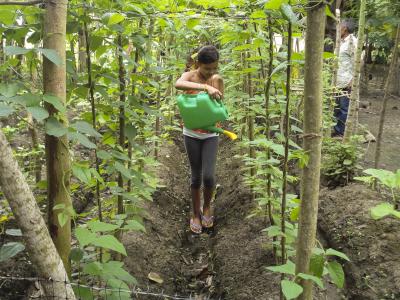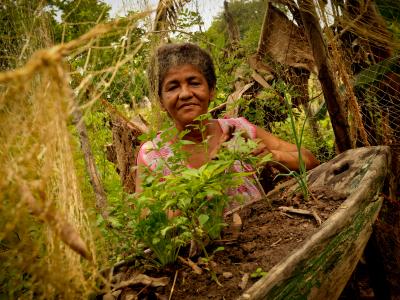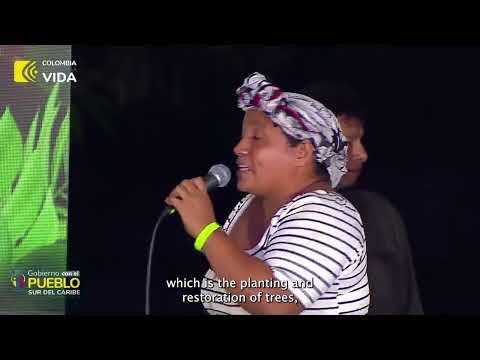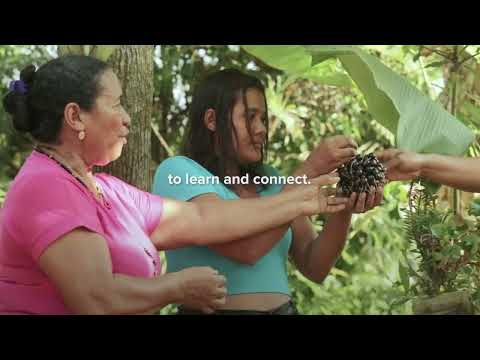
The project 'Scaling up Climate Resilient Water Management Practices for Vulnerable Communities in La Mojana, Colombia' aims to benefit more than 400,000 people, who will participate in strengthening water management, early warning systems and creating livelihoods resilient to climate change. The US$117 million project is implemented by the Colombia’s Adaptation Fund, among other national organizations, with the support of UNDP.
The effects of climate change on La Mojana are severe. The income of its inhabitants is being affected by the loss of crops as well as by large-scale changes to their ecosystems, which translate into increased flood risks and prolonged periods of drought that are putting the lives and livelihoods of smallholder farmers at risk. These pressures induced by climate change are weakening the already threatened water sources in the region, according to the Government of Colombia, affecting both the supply and quality of water that communities need to drink and water crops.
The project puts sustainable ecosystem management at the leading edge of disaster risk reduction by promoting healthier watersheds, protecting communities from floods and supporting poor rural populations to overcome water scarcity during the prolonged dry seasons. This ecosystem-based approach will also work towards achieving Colombia's Nationally Determined Contributions and a low-emission future, and will serve as a model to implement the first comprehensive climate-adaptive regional development plan. This includes the adoption of a long-term risk reduction strategy based not only on infrastructure but also on restoring ecosystem services for regional water management and the direct empowerment of vulnerable communities and regional authorities to manage projected climate risks.
The project will also share new tools and technologies, such as the use of solar power and rain-water harvesting to address long-term water supply problems. This project was built with the support of local institutions, in particular from the Governor of Sucre, the municipalities of Guaranda, Majagual, Caimito, San Marcos, San Benito and Sucre-Sucre in the department of Sucre; Achí in the department of Bolivar, and Ayapel in the department of Cordoba. The universities of Cordoba and Sucre and the Regional Autonomous Corporation of the valleys of Sinú and San Jorge, CVS and Corpomojana, also participated. The most vulnerable communities in La Mojana also participated actively in the formulation of the project, including consultations with peasant and women associations, as well as the Zenues councils and the community councils of Afro-descendants.
The project scales up results that have been achieved in Colombia through other initiatives of the National Environmental System supported by UNDP, such as the Reducing risk and vulnerability to climate change in Colombia project.
- Community
- District
- National
- National Governments
203,918 people residing in Colombia’s La Mojana region will be direct beneficiaries, with a further 201,707 people benefitting indirectly
- Fondo Adaptacion, Colombia
- Green Climate Fund
- United Nations Development Programme (UNDP)
Expected outcomes
Output 1: Systemizing knowledge management of the impacts of climate change on water management for planning purposes
Output 2: Promoting climate resilient water resource infrastructure and ecosystem restoration
Output 3: Improving Early Warning Systems for Climate Resiliency
Output 4: Enhancing rural livelihoods through climate resilient agro-ecosystems
- Image
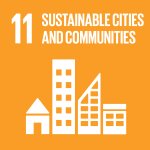
- Image

- Image
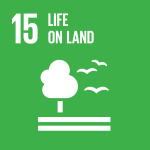
The project 'Scaling up Climate Resilient Water Management Practices for Vulnerable Communities in La Mojana, Colombia' supports the Government of Colombia in scaling up climate resilient integrated water resource management practices in La Mojana - one of the poorest and most climate vulnerable regions in Colombia.
Extreme events, such as intense flooding and prolonged dry seasons have caused significant impacts to the population with climate projections expecting these to become more frequent and intense. Loss of agricultural crops that sustain livelihoods, significant changes to ecosystems that have previously provided a buffer to flooding, and adverse impacts from prolonged dry periods are common and worsening with time. In addition, climate change induced pressures are straining already stressed water sources in the region, affecting both supply and quality.
The government of Colombia has formulated the Climate Change Adaptation Action Plan for La Mojana (La Mojana Action Plan). This action plan differs from past approaches in the region which were reactive and focused on infrastructure solutions that failed to address comprehensive risk. The La Mojana Action Plan in turn promotes a comprehensive approach combining structural and ecosystem-based measures tailored to the environmental and socio-economic conditions of the local population, in order to adapt to projected floods.
The Action Plan, which is being implemented by the Adaptation Fund of Colombia (AF), was formulated based on studies, assessments and hydrological models of the La Mojana region including flooding dynamics as well planning processes that include national, regional and local stakeholders. The plan is innovative in that it prioritizes investment in adaptive and sustainable infrastructure, sanitation, socio-economic development, environmental dynamics recovery and strengthening of governance and local capacities It does this however mostly focusing flood mitigation aimed at protecting large economic drivers and investing in infrastructure such as housing, public works, and wetland canal restoration.
This project will tackle barriers derived from climate change related to lack of access of water sources directed at local populations, loss of resilience of natural ecosystems, limited access of early warning services and products, unsustainable management practices affecting household resilience, non-adapted local livelihoods to climate variability and limited knowledge on relevant issues related to integrated water management resources.
The project will have the objective to enhance climate resilience of vulnerable communities in the La Mojana by focusing on four outputs aimed at: (1) Systemizing knowledge management of the impacts of climate change on water management for planning purposes, (2) Promoting climate resilient water resource infrastructure and ecosystem restoration (3) Improving Early Warning Systems for Climate Resiliency and (4) Enhancing rural livelihoods through climate resilient agro-ecosystems.
Activities will focus on developing technical models and guidelines to enable decision making for long term water management planning, systemizing existing and new knowledge on water management in projected climate scenarios, investing in individual and community alternative water solutions, wetland restoration to recover its valuable water management services, developing climate adapted rural productive practices through technologies and scientific research and collection of traditional best practices, enhancing early warning systems monitoring and products, investing in climate resilient home gardens for crop diversification, and rural extension services.
The first comprehensive climate adaptive regional development plan will serve as a model for the rest of Colombia. This includes adopting a long-term climate change risk informed disaster risk reduction strategy that is based not solely on infrastructure but also on restoring ecosystem services for regional water management. Hence it will revolve around restoring the original hydrology of the wetlands, adapting the local economy and livelihoods to the natural variation in the level of water in the wetlands through the seasons by directly empowering vulnerable communities and regional authorities to manage climate risks. It will also allow the implementation of new technologies to overcome threats posed by climate change impacts on the availability of water supply.
The project scales up results that have already been tried and tested in Colombia while promoting a paradigm shift in the adoption of technology for water supply. The project is designed with significant community involvement to promote their long term resiliency and foster project ownership, with a gender-balanced focus.
The project is aligned with the development goals on climate change adaptation plan of the GoC, including Colombia’s 2015 Nationally Determined Contributions. The project design was informed by significant local and national consultations and has been endorsed by the National Designated Authority (NDA).
Climate change in Colombia
Colombia is among a list of most vulnerable countries in the world to extreme weather impacts due the high recurrence and magnitude of disasters associated with changing climate conditions. Between 1970 and 1999, Colombia experienced an average of 2.97 disasters per year. Both La Niña and El Niño have had, and continues to have, a significant impact in Colombia. The Seismic and Geophysical Observatory of Southwestern Colombia and the Office for Disaster Attention and Prevention state that between the years 1950-2007 rainfall related disasters increased by 16.1% especially during periods of La Niña. The Intergovernmental Panel on Climate Change (IPCC) estimates that the occurrence of disasters related to changing climate conditions in Colombia during 2000-2005 increased by 2.4 times when compared with the period from 1970 to 1999.
Climate change has exacerbated Colombia’s vulnerability as the impacts of La Niña and El Niño have become more frequent and more intense. The most recent La Niña phenomenon (between 2010-2011) was particularly destructive causing sustained damage to much of the country’s infrastructure, economy and human lives. Colombia has, in the last decades, recorded an increased incidence of flooding and prolonged dry periods. These impacts are likely to be magnified as projected changes in precipitation and temperature unfold. National climate change projections suggest that regions across Colombia will be affected differently. Some areas will receive more precipitation. Other regions are expected to face a reduction of rainfall, which coupled with higher temperatures, threaten the availability of water in those regions. For example, projected average precipitation between 2071 and 2100 is expected to decrease by between 10-30% in a third of the total national territory. Municipalities in 14% of the national territory are projected to experience an increase of 10-30% in precipitation during the same period.
With the prevalence of six very different climatic zones in Colombia, anticipated climate change projections call for adaptive solutions that are appropriate for each region. 27.8% of the total population and 47.8% of the rural population in Colombia is classified as poor, when measured under the GoC’s Multidimensional Poverty Index. While important gains have been made at poverty reductions, economic development has not spread evenly throughout the country.
The 60-year-old internal conflict that ended recently isolated certain regions. The lack of continuous access of the government and associated public services to these regions produced development deficiencies in comparison to the national average. The result is pockets of highly vulnerable population to climate change impacts. The La Mojana region, the focus of this project, is one such area.
The GoC is aware of the impact that climate change will have on its economy and in the wellbeing of its population. Colombia’s National Adaptation Plan for Climate Change (PNACC) highlights key steps that the country must make as part of its long term planning and budgeting strategy. The strategy is to be followed by all levels of government to ensure that local action is based on regional priorities (informed by climate projections and vulnerabilities at a local level) and with a focus on protecting the most climate vulnerable, such as those in the region of La Mojana.
While Colombia has made great strides in poverty reduction, positive impacts have not been evenly spread among all regions. This is the case in La Mojana, where poverty levels exceed 1.5 times the median poverty levels in the country. According to the last municipal measurement to the Multidimensional Poverty Index, La Mojana it is one of the poorest regions of the country. In 2005, 83.8% of the population of La Mojana was classified as poor (as measured by GoC’s multidimensional poverty index) when compared with 49.6% of the national average. This situation is a result of highly climate vulnerable work (agriculture and livestock based) that has been recurrently affected by extreme climate (flooding and extended dry periods), rural isolation, lack of basic services (water, sanitation and health) and low education achievement.
Access to reliable sources of safe drinking water is one of the most critical issues in La Mojana. Over 42% of the population has no access to drinking water, and where water is available, the access is extremely unequal. 20% of the population in Magangué lack access to water. In contrast, more than 80% of the population in Achi and Ayapel do not have access to safe water. This situation is only going to be compounded and exacerbated by the projected reduction in precipitation and the higher incidence of more intense and frequent extreme events such as floods and prolonged dry periods. These extreme events, which are already observed today, will not only affect water supply (particularly during prolonged dry periods), but also water quality. During floods, polluted water infiltrates wells and results in contamination of groundwater. The impact on increased morbidity among the population is a concern. For example, in Achi, the second leading cause of death for children under 5 is acute diarrheal diseases (ADD) related to poor drinking water quality.
'Powerful women face the climate crisis in Colombia', UNDP, May 2020
'The hanging gardens of Colombia', ReliefWeb, April 2018
To insulate vulnerable communities from floods and restore wetlands, Colombia promotes the use of recycled materials, suspended gardens and climate-smart agriculture. “I have guavas, lemons, oranges, tangerines, coconuts, passion fruits, chilies, eggplants, yuccas, yams and rice,” says Doña Zoila Guerra, grey-streaked hair framing her sunburnt face. “Every year in December I sell yuccas, which are thin now, but will be good by Christmas.” She speaks proudly as she surveys the cilantro planted in the garden behind her house in the Cuenca Community in San Marcos, Sucre. In 2010, Colombia was hit by widespread flooding. The flood waters wiped out farms, and flows of contaminants from illegal mines damaged crops, poisoned fish and killed mangroves and trees, making it hard for families to put healthy food on the table.
'Campesinos colombianos reciben espaldarazo de US$35 millones del Fondo Verde del Clima' El Espectador Colombia, October 2017
'Green Climate Fund approves project to strengthen climate-resilient water management practices for vulnerable communities in Colombia', ReliefWeb, October 2017
Output 1: Systemizing knowledge management of the impacts of climate change on water management for planning purposes
Activity 1.1. Develop technical models and guidelines to enable decision making for long term water management planning for La Mojana
The project will develop a groundwater flow and quality model to ascertain the long-term dependability of groundwater solutions (a solution that has been implemented in the past through both legal and illegal ground water wells at a household and productive level and has become more common as water has become more scarce).
Activity 1.2 Management of adaptation knowledge on water management
The project will implement a knowledge management program that will create a data bank on adaptive water management, systematize lessons learned and implement training and capacity building programs targeted to relevant stakeholders at the national, regional and local level. The data bank will systematize the lessons learned from the GCF Project and will serve to develop knowledge management tools created to target stakeholders in the region such as municipal authorities, community councils, community leaders, extension workers, productive associations and national authorities. This will include the development of training material (web courses, workbooks, planning guides, etc.) and targeted workshops.
Output 2: Promoting climate resilient water resource infrastructure and ecosystem restoration
Activities through this output are focused on diffusing regionally appropriate climate change risk sensitive water management solutions among rural communities in La Mojana (among both rural disperse and rural nuclei). Through this output, the project will procure goods and services to put in place flood resilient water infrastructure and undertake wetland restoration works. These solutions will advance climate resilient, sustainable and safe water access to La Mojana’s most water vulnerable communities and be congruent to regional climate projections. Sub activities are adapted and differentiated to address the different access needs based on the level of dispersion and water vulnerability of the population
Activity 2.1 Establish Climate Resilient Water Solutions
Activity 2.1.1. Provide household water solutions for the most water vulnerable populations in rural disperse areas.
Activity 2.1.2 Provide community water solutions for water vulnerable populations
Activity 2.1.3. Adaptation of existing water infrastructure solutions in the region.
Activity 2.2. Increase the adaptive capacity of natural ecosystems and ecosystems-based livelihoods
GCF funds will be used to prepare and implement community restorations plans for 41,532 ha of the wetlands (lentic ecosystems) as well as to address the main underlying causes of wetland degradation- livestock use and over grazing. GoC co-financing funds will restore 50 km of wetland channels to reestablish the natural water flow of the three rivers in La Mojana. Restoration will ensure community participation and ownership through strategies aimed at reincorporating wetlands to their livelihoods.
Activity 2.2.1. Establish an integrated wetland restoration plan and monitoring system.
Activity 2.2.2 Implementing community restoration plans for integrated wetland restoration plan.
Activity 2.2.3 Create ecosystem compatible livelihoods.
Activity 2.2.4 Enhance women’s leadership in ecosystem restoration informed by climate change risks.
Activity 2.2.5 will use GCF funds to address a key driver of wetland degradation and support the long term sustainability of community wetland restoration plans by developing a code of good practices for cattle livestock in wetlands.
Output 3: Improving Early Warning Systems for Climate Resiliency
Output 3 will enhance the current early warning system through improved monitoring and forecasting capacity, increased hydrological coverage, and the dissemination of regional and productive relevant alerts that are tailored to users’ needs and communication channels. Management arrangements for the implementation process will include national government agencies such as IDEAM, the local environmental authorities (Corporaciones Autonomas), and the Regional Forecasting Center that is being created with co-financing from the GoC.
Activity 3.1. Enhancement of EWS
Output 4: Enhancing rural livelihoods through climate resilient agro-ecosystems
Output 4 is focused on the promotion of agro-diverse and climate resilient crops in the region and the implementation of climate adapted productive practices to enhance rural livelihoods and enable resiliency to future climate outlooks for La Mojana. GCF funds under output will be used for research and implementation of adaptive local agriculture and livestock practices to favor correct water management at a household, productive and landscape level. The output will enable water resiliency in the region to ensure that livelihoods are adapted to climate projections.
Ativity 4.1. Conduct Agro-ecosystems based livelihood diversification research
Activity 4.2 Improve rural extension for climate resilient adaptation and production.
Activity 4.3 Improve water resource management in vulnerable households for food production systems
- UNDPMontserrat XilotlRegional Technical Advisor







